HI5017: Managerial Accounting: Role of MAS and Accounting Information
VerifiedAdded on 2022/10/19
|17
|4073
|320
Report
AI Summary
This report critically evaluates the role of Management Accounting Systems (MAS) and the provision of accounting information for a multinational manufacturing company. The study identifies various management accounting techniques, such as ABC, TQM, and JIT, and assesses their relevance to contemporary organizations. The report analyzes the evidence from the case company, discussing how MAS supports decision-making at different management levels. The findings are compared with another journal article discussing MAS in Nepalese commercial banks, highlighting the significance of MAS in diverse organizational contexts. The report concludes that MAS plays a vital role in organizational performance and provides lessons for management accountants to enhance efficiency and effectiveness. The analysis highlights that companies should be selective in implementing MAS components, prioritizing those that are most beneficial to their specific needs. The report also emphasizes the importance of decision-making at all management levels, particularly the lower or operational levels, for ensuring organizational success.
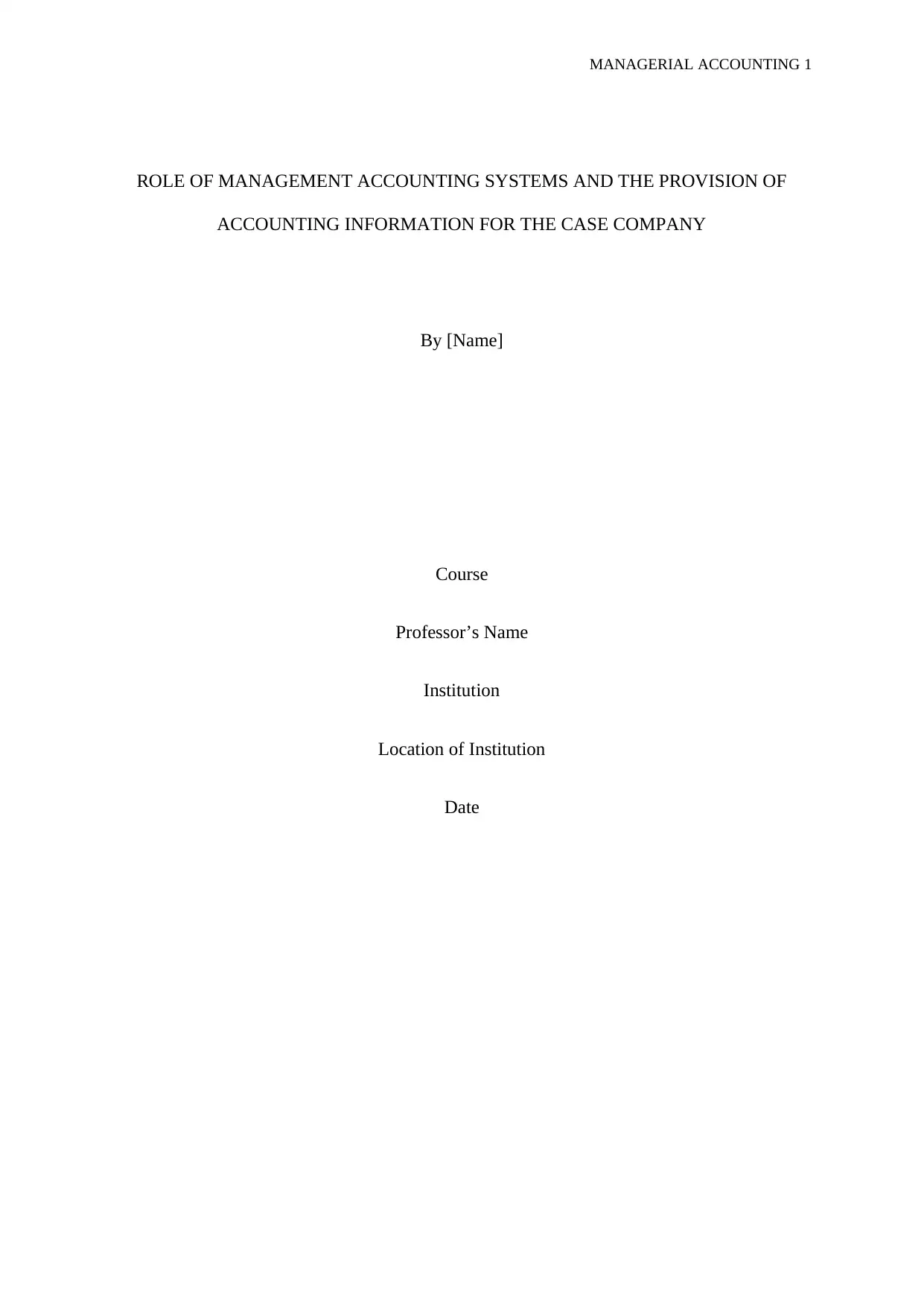
MANAGERIAL ACCOUNTING 1
ROLE OF MANAGEMENT ACCOUNTING SYSTEMS AND THE PROVISION OF
ACCOUNTING INFORMATION FOR THE CASE COMPANY
By [Name]
Course
Professor’s Name
Institution
Location of Institution
Date
ROLE OF MANAGEMENT ACCOUNTING SYSTEMS AND THE PROVISION OF
ACCOUNTING INFORMATION FOR THE CASE COMPANY
By [Name]
Course
Professor’s Name
Institution
Location of Institution
Date
Paraphrase This Document
Need a fresh take? Get an instant paraphrase of this document with our AI Paraphraser
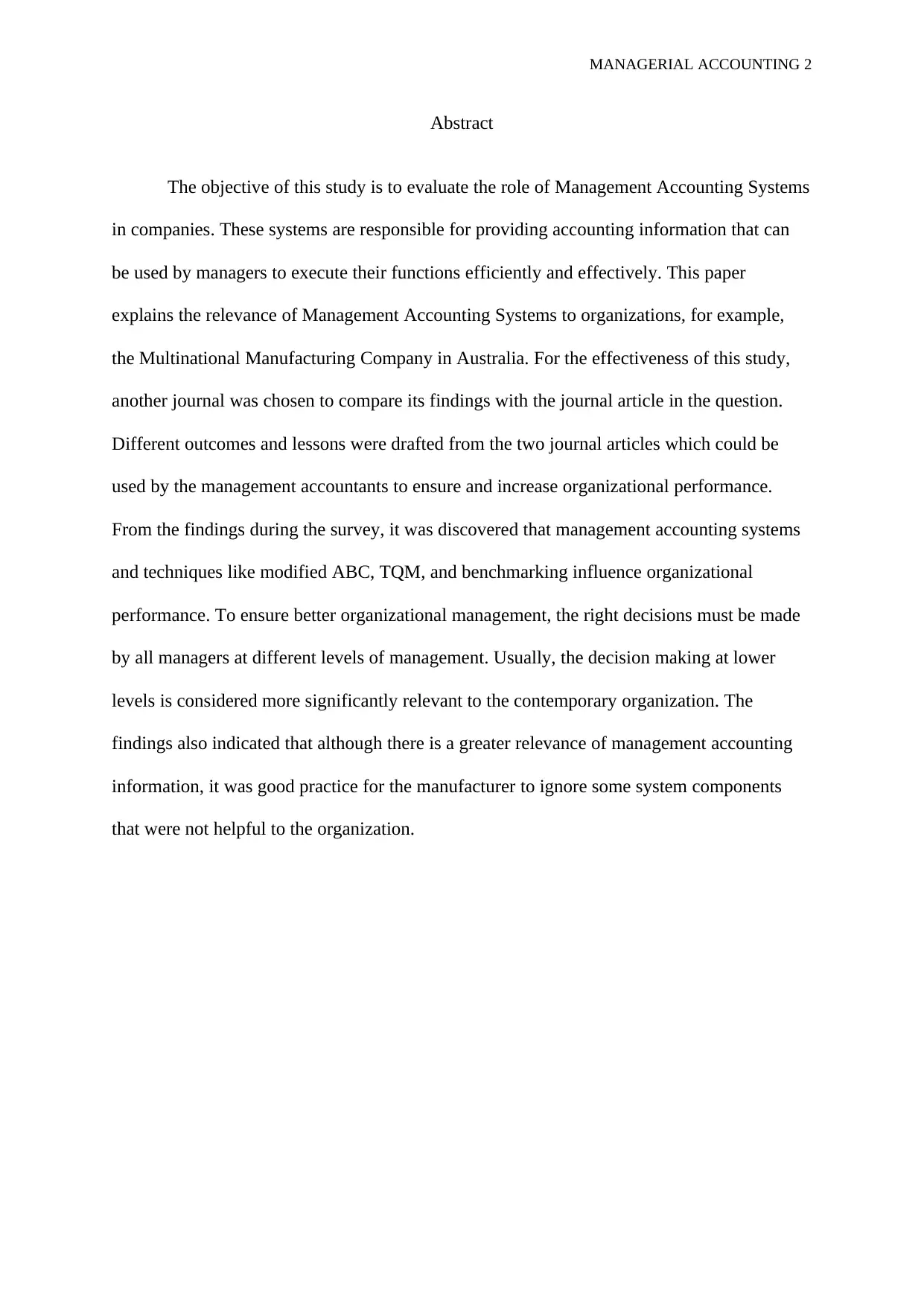
MANAGERIAL ACCOUNTING 2
Abstract
The objective of this study is to evaluate the role of Management Accounting Systems
in companies. These systems are responsible for providing accounting information that can
be used by managers to execute their functions efficiently and effectively. This paper
explains the relevance of Management Accounting Systems to organizations, for example,
the Multinational Manufacturing Company in Australia. For the effectiveness of this study,
another journal was chosen to compare its findings with the journal article in the question.
Different outcomes and lessons were drafted from the two journal articles which could be
used by the management accountants to ensure and increase organizational performance.
From the findings during the survey, it was discovered that management accounting systems
and techniques like modified ABC, TQM, and benchmarking influence organizational
performance. To ensure better organizational management, the right decisions must be made
by all managers at different levels of management. Usually, the decision making at lower
levels is considered more significantly relevant to the contemporary organization. The
findings also indicated that although there is a greater relevance of management accounting
information, it was good practice for the manufacturer to ignore some system components
that were not helpful to the organization.
Abstract
The objective of this study is to evaluate the role of Management Accounting Systems
in companies. These systems are responsible for providing accounting information that can
be used by managers to execute their functions efficiently and effectively. This paper
explains the relevance of Management Accounting Systems to organizations, for example,
the Multinational Manufacturing Company in Australia. For the effectiveness of this study,
another journal was chosen to compare its findings with the journal article in the question.
Different outcomes and lessons were drafted from the two journal articles which could be
used by the management accountants to ensure and increase organizational performance.
From the findings during the survey, it was discovered that management accounting systems
and techniques like modified ABC, TQM, and benchmarking influence organizational
performance. To ensure better organizational management, the right decisions must be made
by all managers at different levels of management. Usually, the decision making at lower
levels is considered more significantly relevant to the contemporary organization. The
findings also indicated that although there is a greater relevance of management accounting
information, it was good practice for the manufacturer to ignore some system components
that were not helpful to the organization.
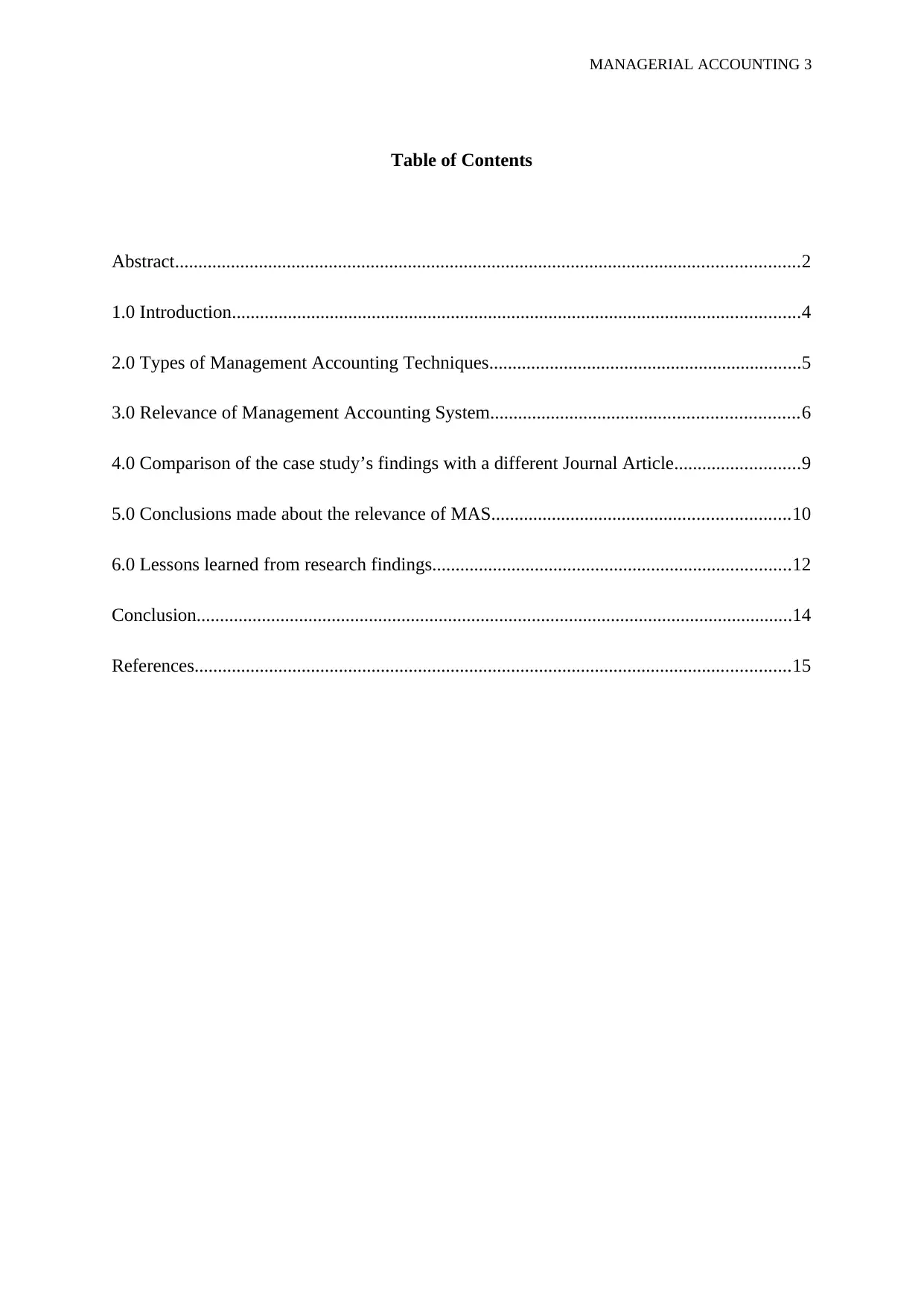
MANAGERIAL ACCOUNTING 3
Table of Contents
Abstract......................................................................................................................................2
1.0 Introduction..........................................................................................................................4
2.0 Types of Management Accounting Techniques...................................................................5
3.0 Relevance of Management Accounting System..................................................................6
4.0 Comparison of the case study’s findings with a different Journal Article...........................9
5.0 Conclusions made about the relevance of MAS................................................................10
6.0 Lessons learned from research findings.............................................................................12
Conclusion................................................................................................................................14
References................................................................................................................................15
Table of Contents
Abstract......................................................................................................................................2
1.0 Introduction..........................................................................................................................4
2.0 Types of Management Accounting Techniques...................................................................5
3.0 Relevance of Management Accounting System..................................................................6
4.0 Comparison of the case study’s findings with a different Journal Article...........................9
5.0 Conclusions made about the relevance of MAS................................................................10
6.0 Lessons learned from research findings.............................................................................12
Conclusion................................................................................................................................14
References................................................................................................................................15
⊘ This is a preview!⊘
Do you want full access?
Subscribe today to unlock all pages.

Trusted by 1+ million students worldwide
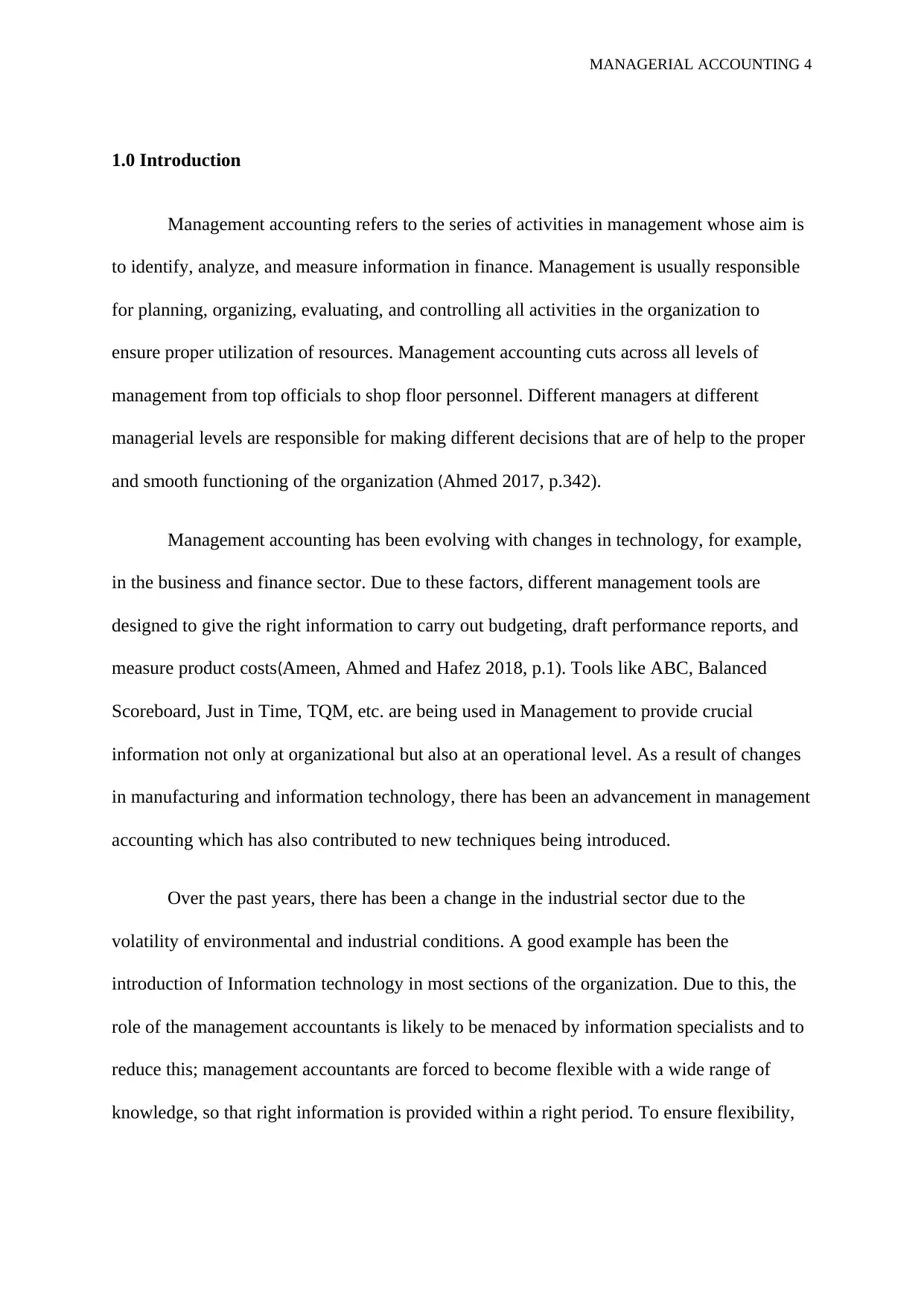
MANAGERIAL ACCOUNTING 4
1.0 Introduction
Management accounting refers to the series of activities in management whose aim is
to identify, analyze, and measure information in finance. Management is usually responsible
for planning, organizing, evaluating, and controlling all activities in the organization to
ensure proper utilization of resources. Management accounting cuts across all levels of
management from top officials to shop floor personnel. Different managers at different
managerial levels are responsible for making different decisions that are of help to the proper
and smooth functioning of the organization (Ahmed 2017, p.342).
Management accounting has been evolving with changes in technology, for example,
in the business and finance sector. Due to these factors, different management tools are
designed to give the right information to carry out budgeting, draft performance reports, and
measure product costs(Ameen, Ahmed and Hafez 2018, p.1). Tools like ABC, Balanced
Scoreboard, Just in Time, TQM, etc. are being used in Management to provide crucial
information not only at organizational but also at an operational level. As a result of changes
in manufacturing and information technology, there has been an advancement in management
accounting which has also contributed to new techniques being introduced.
Over the past years, there has been a change in the industrial sector due to the
volatility of environmental and industrial conditions. A good example has been the
introduction of Information technology in most sections of the organization. Due to this, the
role of the management accountants is likely to be menaced by information specialists and to
reduce this; management accountants are forced to become flexible with a wide range of
knowledge, so that right information is provided within a right period. To ensure flexibility,
1.0 Introduction
Management accounting refers to the series of activities in management whose aim is
to identify, analyze, and measure information in finance. Management is usually responsible
for planning, organizing, evaluating, and controlling all activities in the organization to
ensure proper utilization of resources. Management accounting cuts across all levels of
management from top officials to shop floor personnel. Different managers at different
managerial levels are responsible for making different decisions that are of help to the proper
and smooth functioning of the organization (Ahmed 2017, p.342).
Management accounting has been evolving with changes in technology, for example,
in the business and finance sector. Due to these factors, different management tools are
designed to give the right information to carry out budgeting, draft performance reports, and
measure product costs(Ameen, Ahmed and Hafez 2018, p.1). Tools like ABC, Balanced
Scoreboard, Just in Time, TQM, etc. are being used in Management to provide crucial
information not only at organizational but also at an operational level. As a result of changes
in manufacturing and information technology, there has been an advancement in management
accounting which has also contributed to new techniques being introduced.
Over the past years, there has been a change in the industrial sector due to the
volatility of environmental and industrial conditions. A good example has been the
introduction of Information technology in most sections of the organization. Due to this, the
role of the management accountants is likely to be menaced by information specialists and to
reduce this; management accountants are forced to become flexible with a wide range of
knowledge, so that right information is provided within a right period. To ensure flexibility,
Paraphrase This Document
Need a fresh take? Get an instant paraphrase of this document with our AI Paraphraser
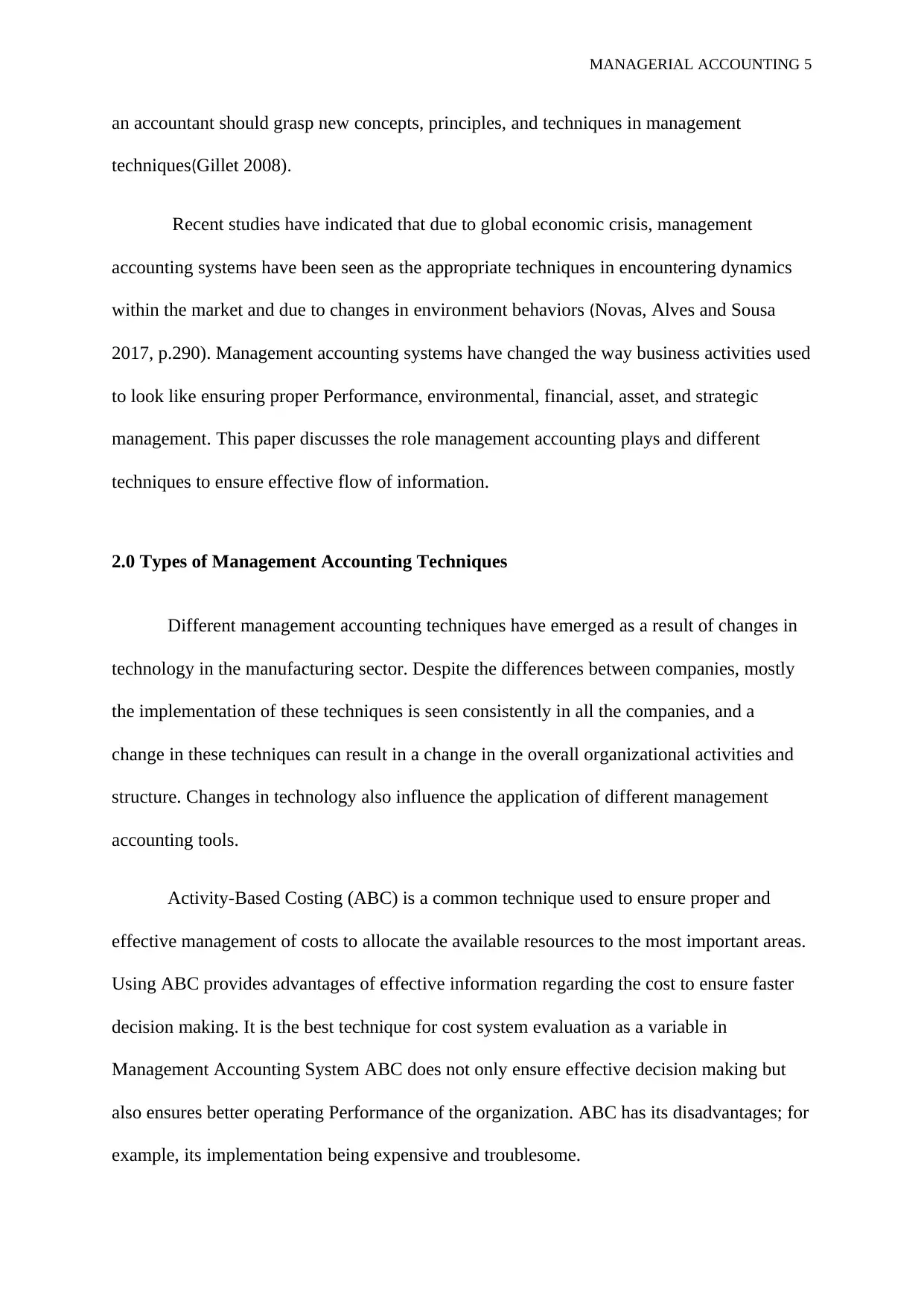
MANAGERIAL ACCOUNTING 5
an accountant should grasp new concepts, principles, and techniques in management
techniques(Gillet 2008).
Recent studies have indicated that due to global economic crisis, management
accounting systems have been seen as the appropriate techniques in encountering dynamics
within the market and due to changes in environment behaviors (Novas, Alves and Sousa
2017, p.290). Management accounting systems have changed the way business activities used
to look like ensuring proper Performance, environmental, financial, asset, and strategic
management. This paper discusses the role management accounting plays and different
techniques to ensure effective flow of information.
2.0 Types of Management Accounting Techniques
Different management accounting techniques have emerged as a result of changes in
technology in the manufacturing sector. Despite the differences between companies, mostly
the implementation of these techniques is seen consistently in all the companies, and a
change in these techniques can result in a change in the overall organizational activities and
structure. Changes in technology also influence the application of different management
accounting tools.
Activity-Based Costing (ABC) is a common technique used to ensure proper and
effective management of costs to allocate the available resources to the most important areas.
Using ABC provides advantages of effective information regarding the cost to ensure faster
decision making. It is the best technique for cost system evaluation as a variable in
Management Accounting System ABC does not only ensure effective decision making but
also ensures better operating Performance of the organization. ABC has its disadvantages; for
example, its implementation being expensive and troublesome.
an accountant should grasp new concepts, principles, and techniques in management
techniques(Gillet 2008).
Recent studies have indicated that due to global economic crisis, management
accounting systems have been seen as the appropriate techniques in encountering dynamics
within the market and due to changes in environment behaviors (Novas, Alves and Sousa
2017, p.290). Management accounting systems have changed the way business activities used
to look like ensuring proper Performance, environmental, financial, asset, and strategic
management. This paper discusses the role management accounting plays and different
techniques to ensure effective flow of information.
2.0 Types of Management Accounting Techniques
Different management accounting techniques have emerged as a result of changes in
technology in the manufacturing sector. Despite the differences between companies, mostly
the implementation of these techniques is seen consistently in all the companies, and a
change in these techniques can result in a change in the overall organizational activities and
structure. Changes in technology also influence the application of different management
accounting tools.
Activity-Based Costing (ABC) is a common technique used to ensure proper and
effective management of costs to allocate the available resources to the most important areas.
Using ABC provides advantages of effective information regarding the cost to ensure faster
decision making. It is the best technique for cost system evaluation as a variable in
Management Accounting System ABC does not only ensure effective decision making but
also ensures better operating Performance of the organization. ABC has its disadvantages; for
example, its implementation being expensive and troublesome.
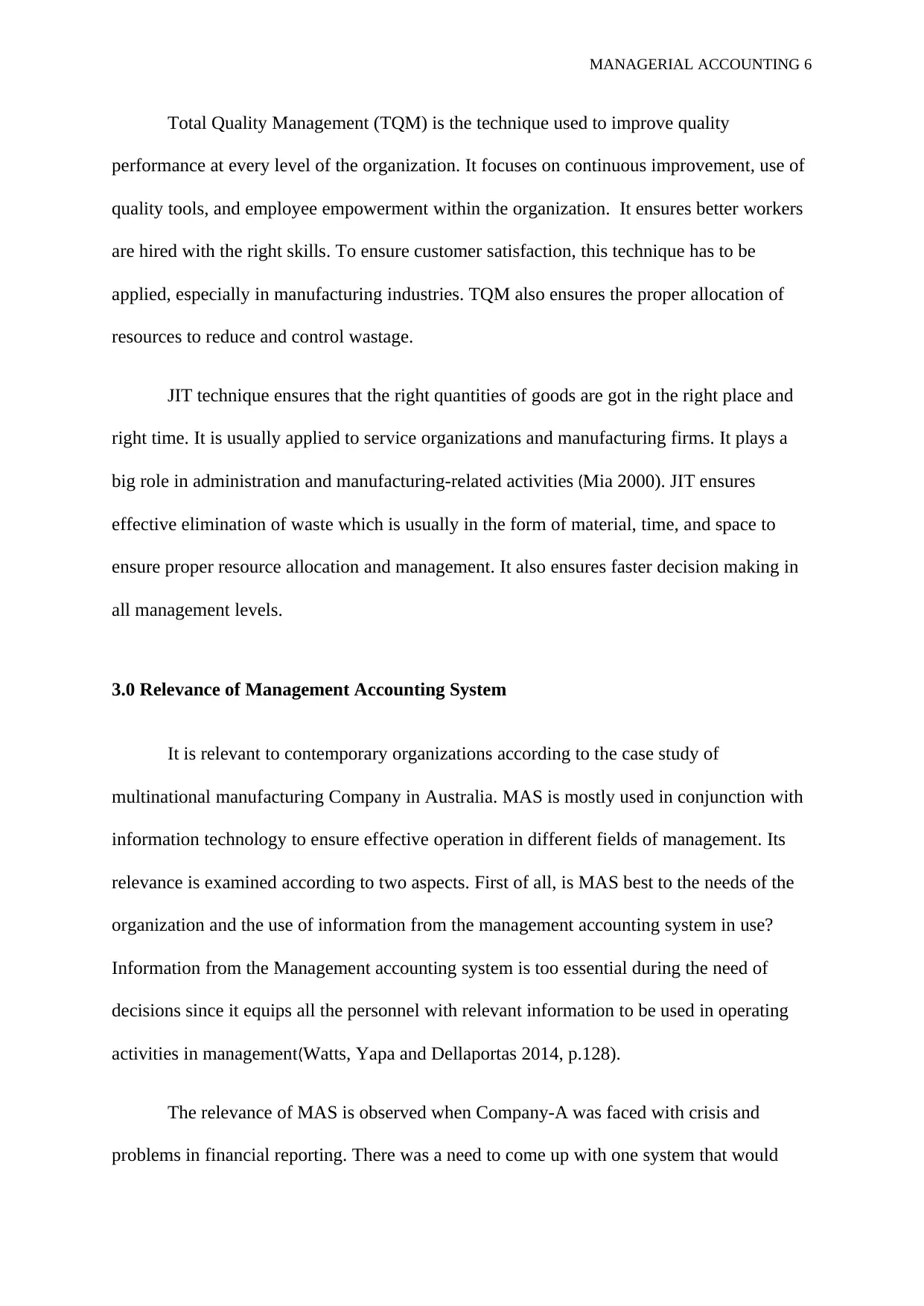
MANAGERIAL ACCOUNTING 6
Total Quality Management (TQM) is the technique used to improve quality
performance at every level of the organization. It focuses on continuous improvement, use of
quality tools, and employee empowerment within the organization. It ensures better workers
are hired with the right skills. To ensure customer satisfaction, this technique has to be
applied, especially in manufacturing industries. TQM also ensures the proper allocation of
resources to reduce and control wastage.
JIT technique ensures that the right quantities of goods are got in the right place and
right time. It is usually applied to service organizations and manufacturing firms. It plays a
big role in administration and manufacturing-related activities (Mia 2000). JIT ensures
effective elimination of waste which is usually in the form of material, time, and space to
ensure proper resource allocation and management. It also ensures faster decision making in
all management levels.
3.0 Relevance of Management Accounting System
It is relevant to contemporary organizations according to the case study of
multinational manufacturing Company in Australia. MAS is mostly used in conjunction with
information technology to ensure effective operation in different fields of management. Its
relevance is examined according to two aspects. First of all, is MAS best to the needs of the
organization and the use of information from the management accounting system in use?
Information from the Management accounting system is too essential during the need of
decisions since it equips all the personnel with relevant information to be used in operating
activities in management(Watts, Yapa and Dellaportas 2014, p.128).
The relevance of MAS is observed when Company-A was faced with crisis and
problems in financial reporting. There was a need to come up with one system that would
Total Quality Management (TQM) is the technique used to improve quality
performance at every level of the organization. It focuses on continuous improvement, use of
quality tools, and employee empowerment within the organization. It ensures better workers
are hired with the right skills. To ensure customer satisfaction, this technique has to be
applied, especially in manufacturing industries. TQM also ensures the proper allocation of
resources to reduce and control wastage.
JIT technique ensures that the right quantities of goods are got in the right place and
right time. It is usually applied to service organizations and manufacturing firms. It plays a
big role in administration and manufacturing-related activities (Mia 2000). JIT ensures
effective elimination of waste which is usually in the form of material, time, and space to
ensure proper resource allocation and management. It also ensures faster decision making in
all management levels.
3.0 Relevance of Management Accounting System
It is relevant to contemporary organizations according to the case study of
multinational manufacturing Company in Australia. MAS is mostly used in conjunction with
information technology to ensure effective operation in different fields of management. Its
relevance is examined according to two aspects. First of all, is MAS best to the needs of the
organization and the use of information from the management accounting system in use?
Information from the Management accounting system is too essential during the need of
decisions since it equips all the personnel with relevant information to be used in operating
activities in management(Watts, Yapa and Dellaportas 2014, p.128).
The relevance of MAS is observed when Company-A was faced with crisis and
problems in financial reporting. There was a need to come up with one system that would
⊘ This is a preview!⊘
Do you want full access?
Subscribe today to unlock all pages.

Trusted by 1+ million students worldwide
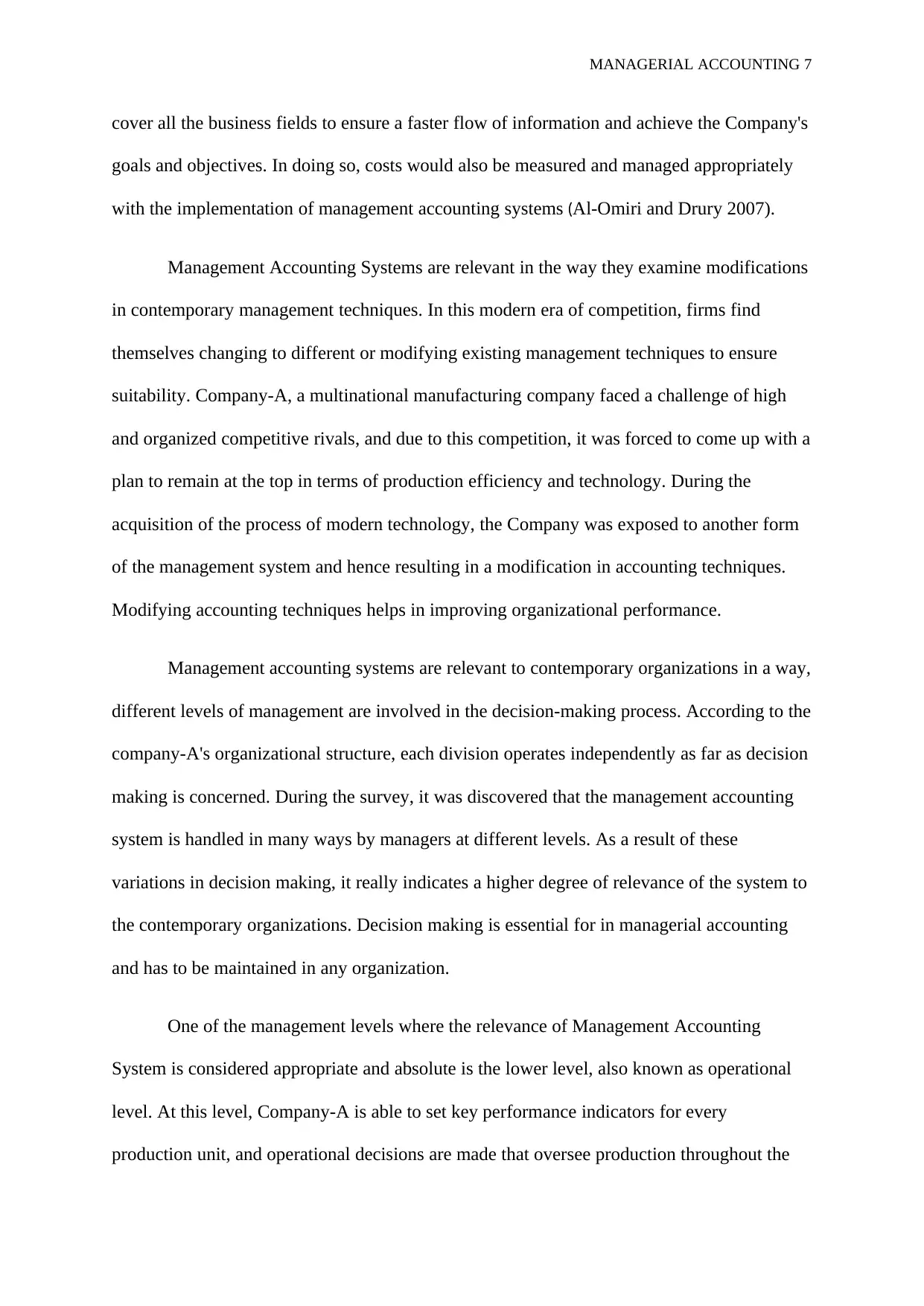
MANAGERIAL ACCOUNTING 7
cover all the business fields to ensure a faster flow of information and achieve the Company's
goals and objectives. In doing so, costs would also be measured and managed appropriately
with the implementation of management accounting systems (Al-Omiri and Drury 2007).
Management Accounting Systems are relevant in the way they examine modifications
in contemporary management techniques. In this modern era of competition, firms find
themselves changing to different or modifying existing management techniques to ensure
suitability. Company-A, a multinational manufacturing company faced a challenge of high
and organized competitive rivals, and due to this competition, it was forced to come up with a
plan to remain at the top in terms of production efficiency and technology. During the
acquisition of the process of modern technology, the Company was exposed to another form
of the management system and hence resulting in a modification in accounting techniques.
Modifying accounting techniques helps in improving organizational performance.
Management accounting systems are relevant to contemporary organizations in a way,
different levels of management are involved in the decision-making process. According to the
company-A's organizational structure, each division operates independently as far as decision
making is concerned. During the survey, it was discovered that the management accounting
system is handled in many ways by managers at different levels. As a result of these
variations in decision making, it really indicates a higher degree of relevance of the system to
the contemporary organizations. Decision making is essential for in managerial accounting
and has to be maintained in any organization.
One of the management levels where the relevance of Management Accounting
System is considered appropriate and absolute is the lower level, also known as operational
level. At this level, Company-A is able to set key performance indicators for every
production unit, and operational decisions are made that oversee production throughout the
cover all the business fields to ensure a faster flow of information and achieve the Company's
goals and objectives. In doing so, costs would also be measured and managed appropriately
with the implementation of management accounting systems (Al-Omiri and Drury 2007).
Management Accounting Systems are relevant in the way they examine modifications
in contemporary management techniques. In this modern era of competition, firms find
themselves changing to different or modifying existing management techniques to ensure
suitability. Company-A, a multinational manufacturing company faced a challenge of high
and organized competitive rivals, and due to this competition, it was forced to come up with a
plan to remain at the top in terms of production efficiency and technology. During the
acquisition of the process of modern technology, the Company was exposed to another form
of the management system and hence resulting in a modification in accounting techniques.
Modifying accounting techniques helps in improving organizational performance.
Management accounting systems are relevant to contemporary organizations in a way,
different levels of management are involved in the decision-making process. According to the
company-A's organizational structure, each division operates independently as far as decision
making is concerned. During the survey, it was discovered that the management accounting
system is handled in many ways by managers at different levels. As a result of these
variations in decision making, it really indicates a higher degree of relevance of the system to
the contemporary organizations. Decision making is essential for in managerial accounting
and has to be maintained in any organization.
One of the management levels where the relevance of Management Accounting
System is considered appropriate and absolute is the lower level, also known as operational
level. At this level, Company-A is able to set key performance indicators for every
production unit, and operational decisions are made that oversee production throughout the
Paraphrase This Document
Need a fresh take? Get an instant paraphrase of this document with our AI Paraphraser
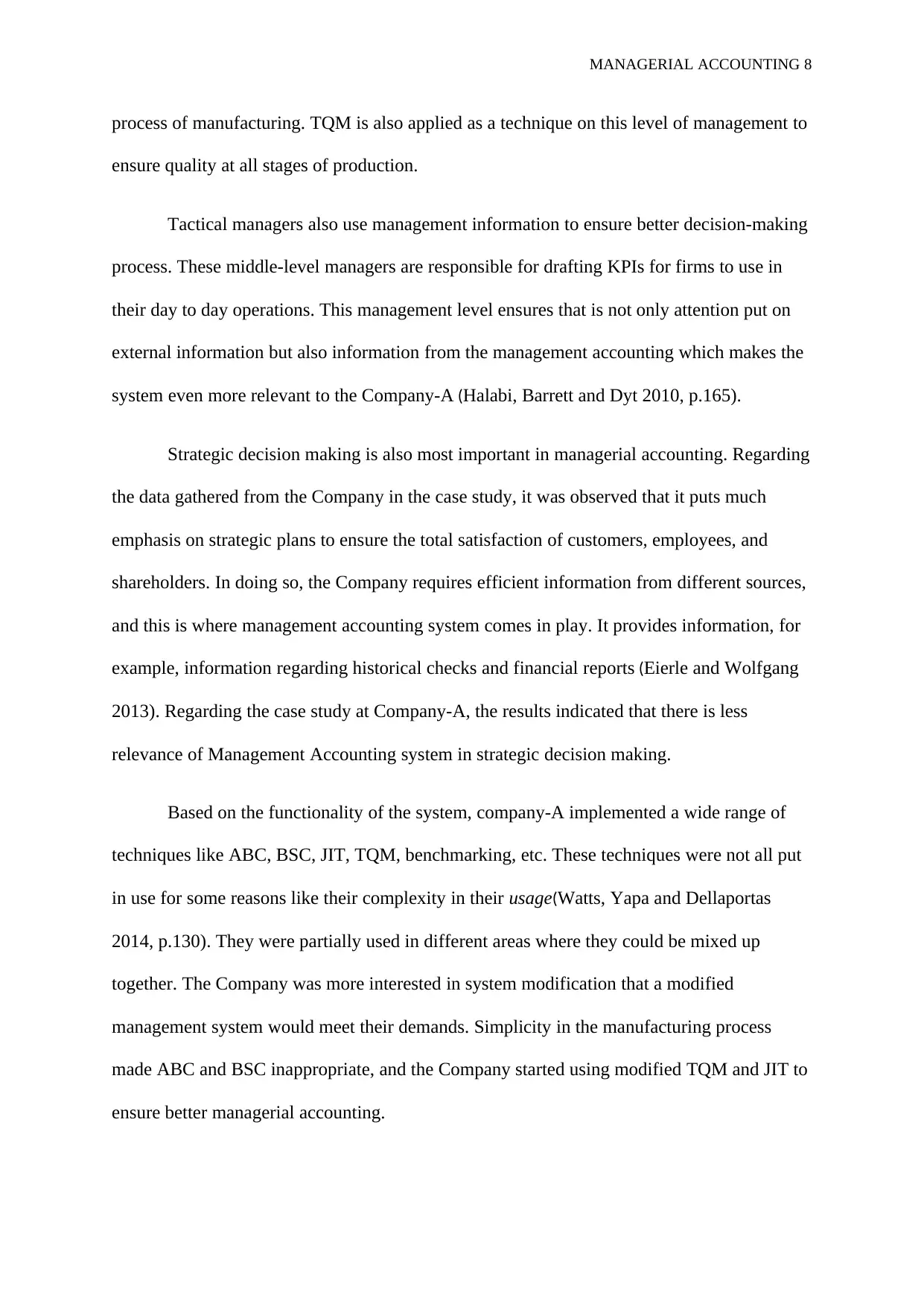
MANAGERIAL ACCOUNTING 8
process of manufacturing. TQM is also applied as a technique on this level of management to
ensure quality at all stages of production.
Tactical managers also use management information to ensure better decision-making
process. These middle-level managers are responsible for drafting KPIs for firms to use in
their day to day operations. This management level ensures that is not only attention put on
external information but also information from the management accounting which makes the
system even more relevant to the Company-A (Halabi, Barrett and Dyt 2010, p.165).
Strategic decision making is also most important in managerial accounting. Regarding
the data gathered from the Company in the case study, it was observed that it puts much
emphasis on strategic plans to ensure the total satisfaction of customers, employees, and
shareholders. In doing so, the Company requires efficient information from different sources,
and this is where management accounting system comes in play. It provides information, for
example, information regarding historical checks and financial reports (Eierle and Wolfgang
2013). Regarding the case study at Company-A, the results indicated that there is less
relevance of Management Accounting system in strategic decision making.
Based on the functionality of the system, company-A implemented a wide range of
techniques like ABC, BSC, JIT, TQM, benchmarking, etc. These techniques were not all put
in use for some reasons like their complexity in their usage(Watts, Yapa and Dellaportas
2014, p.130). They were partially used in different areas where they could be mixed up
together. The Company was more interested in system modification that a modified
management system would meet their demands. Simplicity in the manufacturing process
made ABC and BSC inappropriate, and the Company started using modified TQM and JIT to
ensure better managerial accounting.
process of manufacturing. TQM is also applied as a technique on this level of management to
ensure quality at all stages of production.
Tactical managers also use management information to ensure better decision-making
process. These middle-level managers are responsible for drafting KPIs for firms to use in
their day to day operations. This management level ensures that is not only attention put on
external information but also information from the management accounting which makes the
system even more relevant to the Company-A (Halabi, Barrett and Dyt 2010, p.165).
Strategic decision making is also most important in managerial accounting. Regarding
the data gathered from the Company in the case study, it was observed that it puts much
emphasis on strategic plans to ensure the total satisfaction of customers, employees, and
shareholders. In doing so, the Company requires efficient information from different sources,
and this is where management accounting system comes in play. It provides information, for
example, information regarding historical checks and financial reports (Eierle and Wolfgang
2013). Regarding the case study at Company-A, the results indicated that there is less
relevance of Management Accounting system in strategic decision making.
Based on the functionality of the system, company-A implemented a wide range of
techniques like ABC, BSC, JIT, TQM, benchmarking, etc. These techniques were not all put
in use for some reasons like their complexity in their usage(Watts, Yapa and Dellaportas
2014, p.130). They were partially used in different areas where they could be mixed up
together. The Company was more interested in system modification that a modified
management system would meet their demands. Simplicity in the manufacturing process
made ABC and BSC inappropriate, and the Company started using modified TQM and JIT to
ensure better managerial accounting.
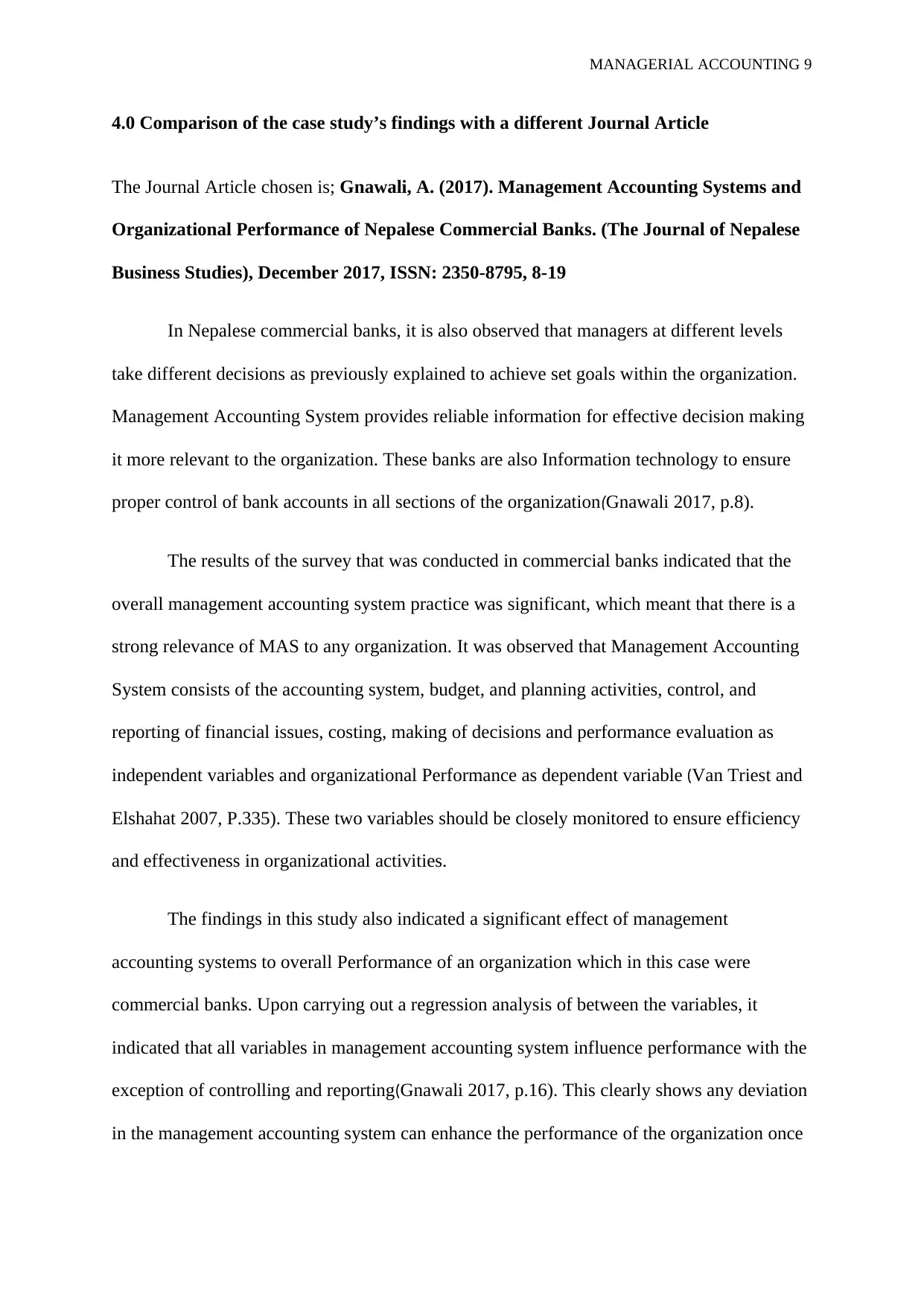
MANAGERIAL ACCOUNTING 9
4.0 Comparison of the case study’s findings with a different Journal Article
The Journal Article chosen is; Gnawali, A. (2017). Management Accounting Systems and
Organizational Performance of Nepalese Commercial Banks. (The Journal of Nepalese
Business Studies), December 2017, ISSN: 2350-8795, 8-19
In Nepalese commercial banks, it is also observed that managers at different levels
take different decisions as previously explained to achieve set goals within the organization.
Management Accounting System provides reliable information for effective decision making
it more relevant to the organization. These banks are also Information technology to ensure
proper control of bank accounts in all sections of the organization(Gnawali 2017, p.8).
The results of the survey that was conducted in commercial banks indicated that the
overall management accounting system practice was significant, which meant that there is a
strong relevance of MAS to any organization. It was observed that Management Accounting
System consists of the accounting system, budget, and planning activities, control, and
reporting of financial issues, costing, making of decisions and performance evaluation as
independent variables and organizational Performance as dependent variable (Van Triest and
Elshahat 2007, P.335). These two variables should be closely monitored to ensure efficiency
and effectiveness in organizational activities.
The findings in this study also indicated a significant effect of management
accounting systems to overall Performance of an organization which in this case were
commercial banks. Upon carrying out a regression analysis of between the variables, it
indicated that all variables in management accounting system influence performance with the
exception of controlling and reporting(Gnawali 2017, p.16). This clearly shows any deviation
in the management accounting system can enhance the performance of the organization once
4.0 Comparison of the case study’s findings with a different Journal Article
The Journal Article chosen is; Gnawali, A. (2017). Management Accounting Systems and
Organizational Performance of Nepalese Commercial Banks. (The Journal of Nepalese
Business Studies), December 2017, ISSN: 2350-8795, 8-19
In Nepalese commercial banks, it is also observed that managers at different levels
take different decisions as previously explained to achieve set goals within the organization.
Management Accounting System provides reliable information for effective decision making
it more relevant to the organization. These banks are also Information technology to ensure
proper control of bank accounts in all sections of the organization(Gnawali 2017, p.8).
The results of the survey that was conducted in commercial banks indicated that the
overall management accounting system practice was significant, which meant that there is a
strong relevance of MAS to any organization. It was observed that Management Accounting
System consists of the accounting system, budget, and planning activities, control, and
reporting of financial issues, costing, making of decisions and performance evaluation as
independent variables and organizational Performance as dependent variable (Van Triest and
Elshahat 2007, P.335). These two variables should be closely monitored to ensure efficiency
and effectiveness in organizational activities.
The findings in this study also indicated a significant effect of management
accounting systems to overall Performance of an organization which in this case were
commercial banks. Upon carrying out a regression analysis of between the variables, it
indicated that all variables in management accounting system influence performance with the
exception of controlling and reporting(Gnawali 2017, p.16). This clearly shows any deviation
in the management accounting system can enhance the performance of the organization once
⊘ This is a preview!⊘
Do you want full access?
Subscribe today to unlock all pages.

Trusted by 1+ million students worldwide
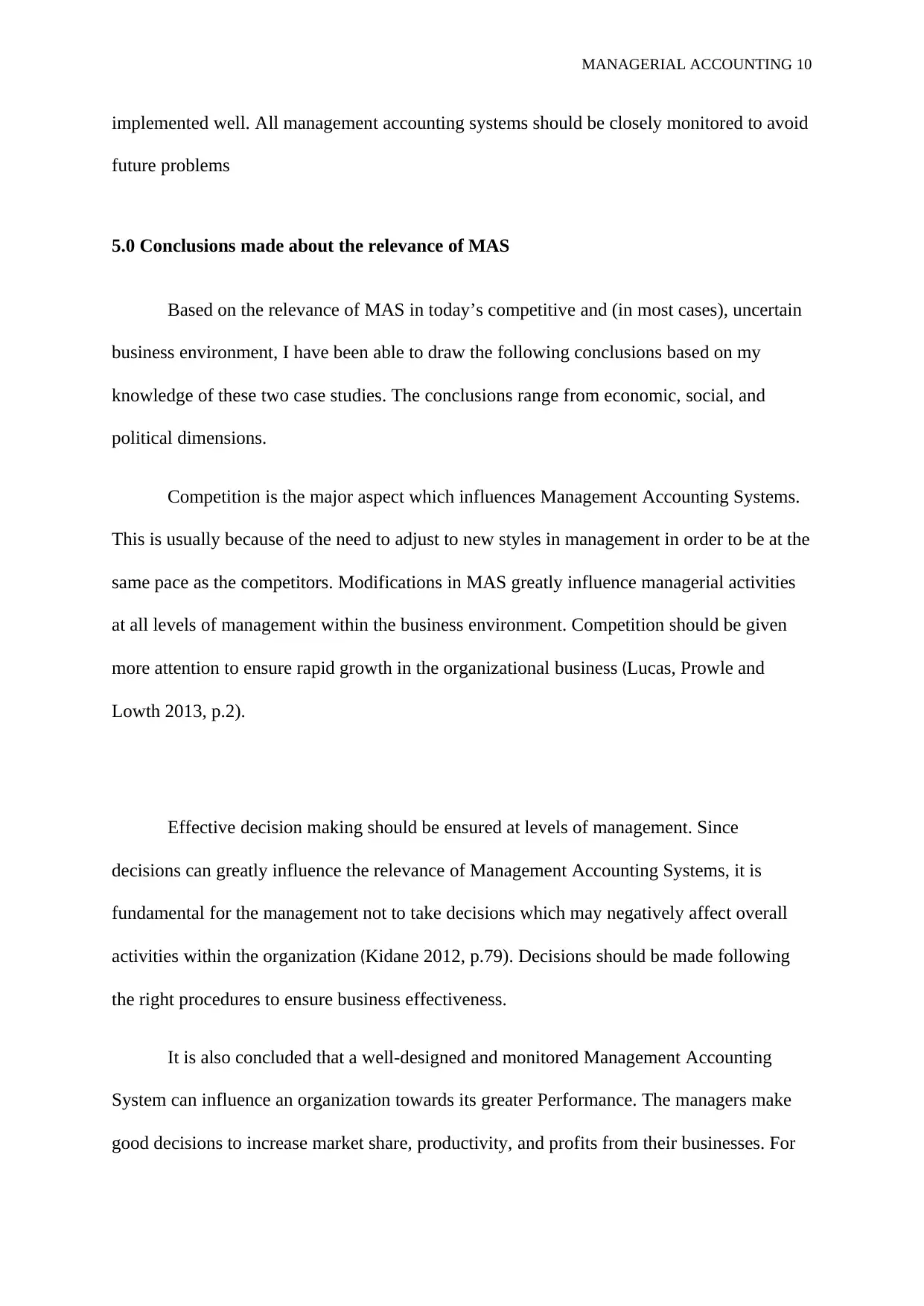
MANAGERIAL ACCOUNTING 10
implemented well. All management accounting systems should be closely monitored to avoid
future problems
5.0 Conclusions made about the relevance of MAS
Based on the relevance of MAS in today’s competitive and (in most cases), uncertain
business environment, I have been able to draw the following conclusions based on my
knowledge of these two case studies. The conclusions range from economic, social, and
political dimensions.
Competition is the major aspect which influences Management Accounting Systems.
This is usually because of the need to adjust to new styles in management in order to be at the
same pace as the competitors. Modifications in MAS greatly influence managerial activities
at all levels of management within the business environment. Competition should be given
more attention to ensure rapid growth in the organizational business (Lucas, Prowle and
Lowth 2013, p.2).
Effective decision making should be ensured at levels of management. Since
decisions can greatly influence the relevance of Management Accounting Systems, it is
fundamental for the management not to take decisions which may negatively affect overall
activities within the organization (Kidane 2012, p.79). Decisions should be made following
the right procedures to ensure business effectiveness.
It is also concluded that a well-designed and monitored Management Accounting
System can influence an organization towards its greater Performance. The managers make
good decisions to increase market share, productivity, and profits from their businesses. For
implemented well. All management accounting systems should be closely monitored to avoid
future problems
5.0 Conclusions made about the relevance of MAS
Based on the relevance of MAS in today’s competitive and (in most cases), uncertain
business environment, I have been able to draw the following conclusions based on my
knowledge of these two case studies. The conclusions range from economic, social, and
political dimensions.
Competition is the major aspect which influences Management Accounting Systems.
This is usually because of the need to adjust to new styles in management in order to be at the
same pace as the competitors. Modifications in MAS greatly influence managerial activities
at all levels of management within the business environment. Competition should be given
more attention to ensure rapid growth in the organizational business (Lucas, Prowle and
Lowth 2013, p.2).
Effective decision making should be ensured at levels of management. Since
decisions can greatly influence the relevance of Management Accounting Systems, it is
fundamental for the management not to take decisions which may negatively affect overall
activities within the organization (Kidane 2012, p.79). Decisions should be made following
the right procedures to ensure business effectiveness.
It is also concluded that a well-designed and monitored Management Accounting
System can influence an organization towards its greater Performance. The managers make
good decisions to increase market share, productivity, and profits from their businesses. For
Paraphrase This Document
Need a fresh take? Get an instant paraphrase of this document with our AI Paraphraser
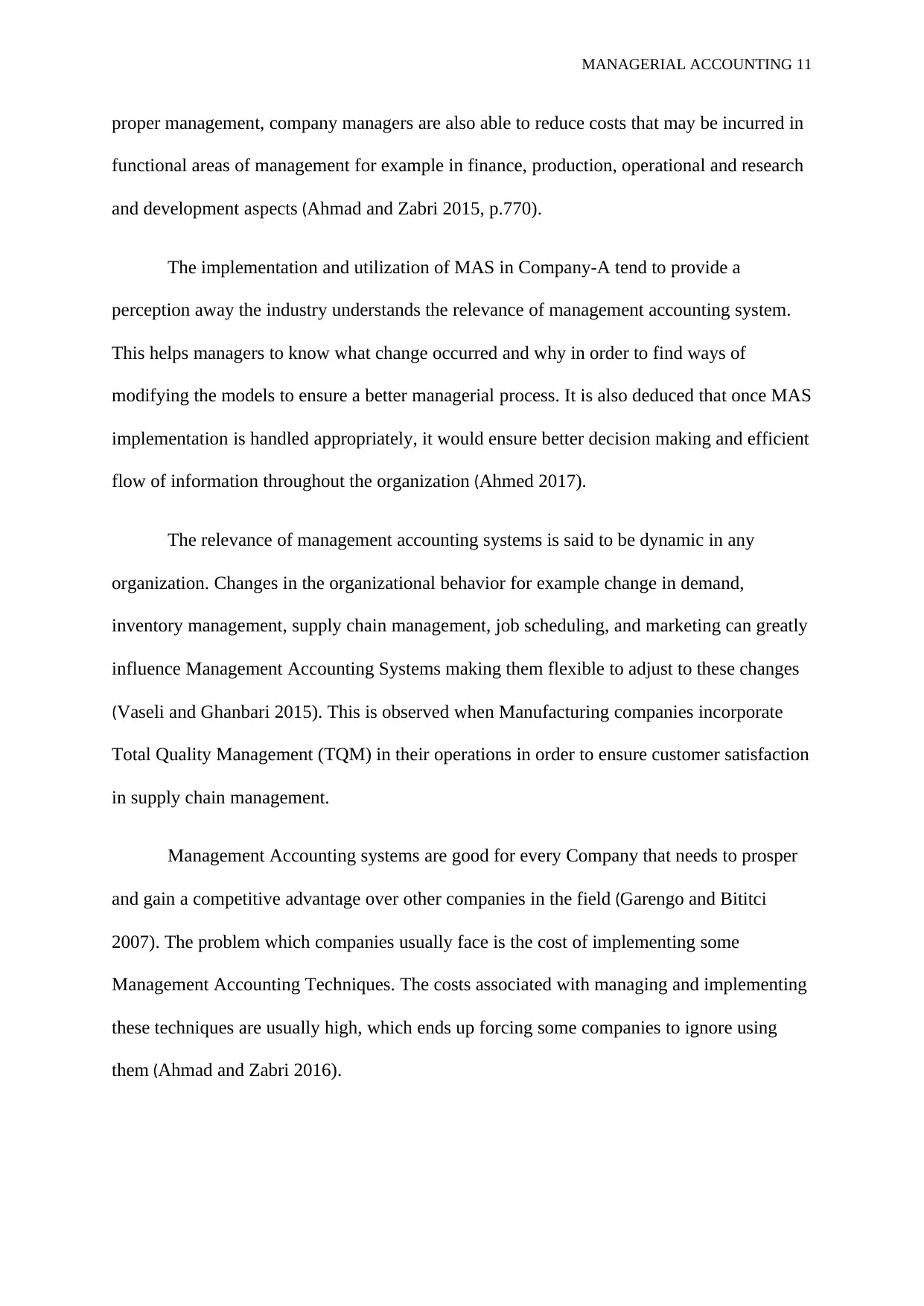
MANAGERIAL ACCOUNTING 11
proper management, company managers are also able to reduce costs that may be incurred in
functional areas of management for example in finance, production, operational and research
and development aspects (Ahmad and Zabri 2015, p.770).
The implementation and utilization of MAS in Company-A tend to provide a
perception away the industry understands the relevance of management accounting system.
This helps managers to know what change occurred and why in order to find ways of
modifying the models to ensure a better managerial process. It is also deduced that once MAS
implementation is handled appropriately, it would ensure better decision making and efficient
flow of information throughout the organization (Ahmed 2017).
The relevance of management accounting systems is said to be dynamic in any
organization. Changes in the organizational behavior for example change in demand,
inventory management, supply chain management, job scheduling, and marketing can greatly
influence Management Accounting Systems making them flexible to adjust to these changes
(Vaseli and Ghanbari 2015). This is observed when Manufacturing companies incorporate
Total Quality Management (TQM) in their operations in order to ensure customer satisfaction
in supply chain management.
Management Accounting systems are good for every Company that needs to prosper
and gain a competitive advantage over other companies in the field (Garengo and Bititci
2007). The problem which companies usually face is the cost of implementing some
Management Accounting Techniques. The costs associated with managing and implementing
these techniques are usually high, which ends up forcing some companies to ignore using
them (Ahmad and Zabri 2016).
proper management, company managers are also able to reduce costs that may be incurred in
functional areas of management for example in finance, production, operational and research
and development aspects (Ahmad and Zabri 2015, p.770).
The implementation and utilization of MAS in Company-A tend to provide a
perception away the industry understands the relevance of management accounting system.
This helps managers to know what change occurred and why in order to find ways of
modifying the models to ensure a better managerial process. It is also deduced that once MAS
implementation is handled appropriately, it would ensure better decision making and efficient
flow of information throughout the organization (Ahmed 2017).
The relevance of management accounting systems is said to be dynamic in any
organization. Changes in the organizational behavior for example change in demand,
inventory management, supply chain management, job scheduling, and marketing can greatly
influence Management Accounting Systems making them flexible to adjust to these changes
(Vaseli and Ghanbari 2015). This is observed when Manufacturing companies incorporate
Total Quality Management (TQM) in their operations in order to ensure customer satisfaction
in supply chain management.
Management Accounting systems are good for every Company that needs to prosper
and gain a competitive advantage over other companies in the field (Garengo and Bititci
2007). The problem which companies usually face is the cost of implementing some
Management Accounting Techniques. The costs associated with managing and implementing
these techniques are usually high, which ends up forcing some companies to ignore using
them (Ahmad and Zabri 2016).
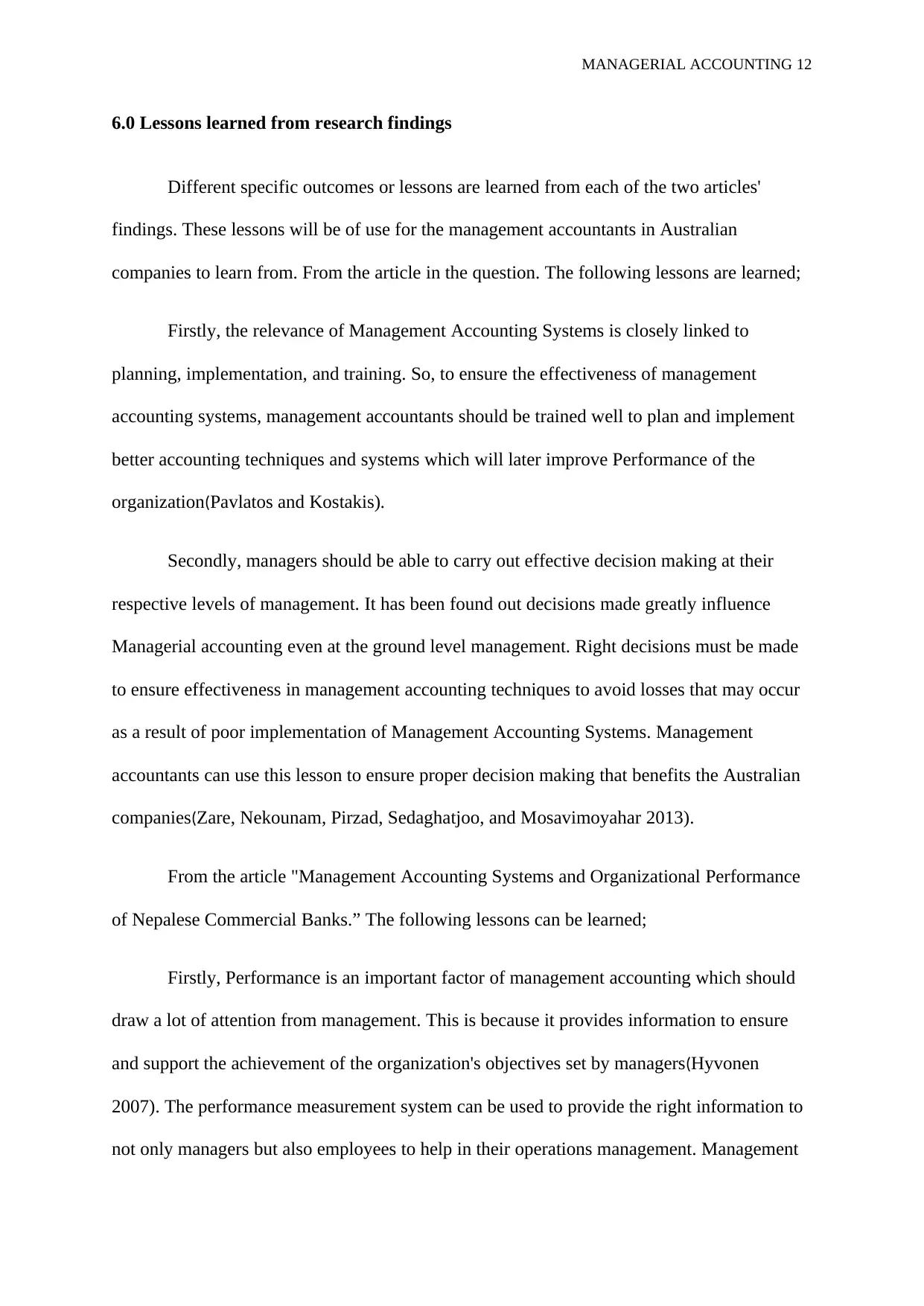
MANAGERIAL ACCOUNTING 12
6.0 Lessons learned from research findings
Different specific outcomes or lessons are learned from each of the two articles'
findings. These lessons will be of use for the management accountants in Australian
companies to learn from. From the article in the question. The following lessons are learned;
Firstly, the relevance of Management Accounting Systems is closely linked to
planning, implementation, and training. So, to ensure the effectiveness of management
accounting systems, management accountants should be trained well to plan and implement
better accounting techniques and systems which will later improve Performance of the
organization(Pavlatos and Kostakis).
Secondly, managers should be able to carry out effective decision making at their
respective levels of management. It has been found out decisions made greatly influence
Managerial accounting even at the ground level management. Right decisions must be made
to ensure effectiveness in management accounting techniques to avoid losses that may occur
as a result of poor implementation of Management Accounting Systems. Management
accountants can use this lesson to ensure proper decision making that benefits the Australian
companies(Zare, Nekounam, Pirzad, Sedaghatjoo, and Mosavimoyahar 2013).
From the article "Management Accounting Systems and Organizational Performance
of Nepalese Commercial Banks.” The following lessons can be learned;
Firstly, Performance is an important factor of management accounting which should
draw a lot of attention from management. This is because it provides information to ensure
and support the achievement of the organization's objectives set by managers(Hyvonen
2007). The performance measurement system can be used to provide the right information to
not only managers but also employees to help in their operations management. Management
6.0 Lessons learned from research findings
Different specific outcomes or lessons are learned from each of the two articles'
findings. These lessons will be of use for the management accountants in Australian
companies to learn from. From the article in the question. The following lessons are learned;
Firstly, the relevance of Management Accounting Systems is closely linked to
planning, implementation, and training. So, to ensure the effectiveness of management
accounting systems, management accountants should be trained well to plan and implement
better accounting techniques and systems which will later improve Performance of the
organization(Pavlatos and Kostakis).
Secondly, managers should be able to carry out effective decision making at their
respective levels of management. It has been found out decisions made greatly influence
Managerial accounting even at the ground level management. Right decisions must be made
to ensure effectiveness in management accounting techniques to avoid losses that may occur
as a result of poor implementation of Management Accounting Systems. Management
accountants can use this lesson to ensure proper decision making that benefits the Australian
companies(Zare, Nekounam, Pirzad, Sedaghatjoo, and Mosavimoyahar 2013).
From the article "Management Accounting Systems and Organizational Performance
of Nepalese Commercial Banks.” The following lessons can be learned;
Firstly, Performance is an important factor of management accounting which should
draw a lot of attention from management. This is because it provides information to ensure
and support the achievement of the organization's objectives set by managers(Hyvonen
2007). The performance measurement system can be used to provide the right information to
not only managers but also employees to help in their operations management. Management
⊘ This is a preview!⊘
Do you want full access?
Subscribe today to unlock all pages.

Trusted by 1+ million students worldwide
1 out of 17
Related Documents
Your All-in-One AI-Powered Toolkit for Academic Success.
+13062052269
info@desklib.com
Available 24*7 on WhatsApp / Email
![[object Object]](/_next/static/media/star-bottom.7253800d.svg)
Unlock your academic potential
Copyright © 2020–2026 A2Z Services. All Rights Reserved. Developed and managed by ZUCOL.





